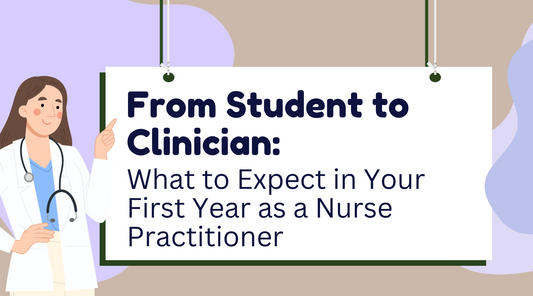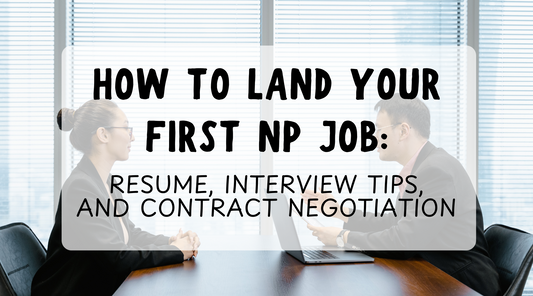Becoming a Nurse Practitioner (NP) offers tremendous opportunities for advanced practice in healthcare, allowing you to specialize in a specific area and significantly impact patients' lives. With so many specialties available, determining the right path can be overwhelming. In this guide, we’ll take a deep dive into the diverse Nurse Practitioner (NP) specialties—such as Family Nurse Practitioner (FNP), Adult-Gerontology Nurse Practitioner (AGNP), Acute Care Nurse Practitioner (ACNP), Pediatric Nurse Practitioner (PNP), Neonatal Nurse Practitioner (NNP), Psychiatric-Mental Health Nurse Practitioner (PMHNP), Women’s Health Nurse Practitioner (WHNP), and Cardiovascular Nurse Practitioner (CVNP)—to help you make an informed decision about your future in nursing.
1. Family Nurse Practitioner (FNP)
Overview:
Family Nurse Practitioners provide primary healthcare to individuals across the lifespan, from infants to the elderly. FNPs play a crucial role in delivering health promotion, disease prevention, and chronic disease management in diverse healthcare settings such as outpatient clinics, community health centers, and private practices.
Pros:
- Versatility: FNPs can work in a wide array of settings, addressing health needs at all stages of life.
- Holistic Approach: Focuses on the well-being of families, encompassing both physical and mental health.
- High Job Demand: FNPs are highly sought after, especially due to the increased emphasis on preventive care and primary care access.
Cons:
- Broad Scope: Managing a wide range of health conditions for various age groups can be complex.
- Less Specialization: If you're looking for deep expertise in a single area, this broad specialty might be less fulfilling.
2. Adult-Gerontology Nurse Practitioner (AGNP)
Overview:
Adult-Gerontology Nurse Practitioners specialize in caring for adults and aging patients. They focus on chronic illness management, preventive care, and improving the quality of life for older adults. They work in hospitals, nursing homes, rehabilitation centers, and outpatient practices.
Pros:
- Focused Expertise: Develop specialized skills in managing chronic health issues prevalent in older adults.
- Growing Need: With the aging population, the demand for AGNPs is on the rise.
- Comprehensive Care: Provide critical care services and preventive strategies to older patients, improving quality of life.
Cons:
- Limited Age Range: Practice mostly with adults and seniors, reducing the scope of your patient demographics.
- Complex Cases: Older patients often have multiple, complex health conditions requiring intensive management.
3. Acute Care Nurse Practitioner (ACNP)
Overview:
Acute Care Nurse Practitioners work in high-pressure settings such as ICUs, emergency departments, and hospitals, providing care for acutely ill or injured patients. They perform complex assessments, procedures, and collaborate with multidisciplinary teams to manage critical conditions.
Pros:
- High-Intensity Work: ACNPs enjoy dynamic work environments where each day is fast-paced and ever-changing.
- Procedural Skills: You’ll gain expertise in diagnostic and therapeutic procedures.
- Collaboration: Close teamwork with physicians, nurses, and specialists enhances the quality of patient care.
Cons:
- Limited Age Range: Many ACNPs work primarily with adults or those in critical conditions.
- Stressful Environment: Working in intensive care and emergency settings can be emotionally and physically taxing.
4. Pediatric Nurse Practitioner (PNP)
Overview:
Pediatric Nurse Practitioners provide primary and specialty care to children from infancy through adolescence. They work in pediatric clinics, children’s hospitals, schools, and community health settings to promote healthy development and manage illness and injury.
Pros:
- Focused Pediatric Care: Specialize in the health and developmental needs of children.
- Preventive Health: Emphasis on regular screenings, immunizations, and educational health programs.
- Building Relationships: Foster long-term relationships with pediatric patients and their families.
Cons:
- Narrow Patient Range: PNPs are focused only on pediatric patients, limiting your scope of practice.
- Emotional Challenges: Managing severe pediatric illness or emergency cases can be emotionally overwhelming.
5. Neonatal Nurse Practitioner (NNP)
Overview:
Neonatal Nurse Practitioners care for critically ill or premature newborns, especially those in Neonatal Intensive Care Units (NICUs). They provide advanced care, collaborate with neonatologists, and work in high-stress environments to improve infant outcomes.
Pros:
- Intensive Care Role: Care for vulnerable neonates, making a profound impact on their health outcomes.
- Critical Collaboration: Work in close partnership with neonatologists and pediatric specialists.
- Specialized Skills: Develop expertise in neonatal care and management.
Cons:
- Emotionally Demanding: The high-stakes environment of NICUs can be taxing on your emotional resilience.
- High-Stress Setting: NICUs are fast-paced and can be stressful, both emotionally and physically.
6. Psychiatric-Mental Health Nurse Practitioner (PMHNP)
Overview:
Psychiatric-Mental Health Nurse Practitioners assess, diagnose, and treat mental health conditions across the lifespan. PMHNPs may work in a variety of settings such as psychiatric hospitals, mental health clinics, or private practices, focusing on mental wellness and patient advocacy.
Pros:
- Mental Health Focus: Specialize in addressing the growing need for mental health care.
- Holistic Approach: Treat both the psychological and physical aspects of mental wellness.
- High Demand: As awareness of mental health issues rises, there is an increasing need for PMHNPs.
Cons:
- Emotional Toll: Managing patients with complex mental health disorders can be emotionally draining.
- Limited Procedures: Compared to other specialties, PMHNPs tend not to perform as many medical procedures.
7. Women’s Health Nurse Practitioner (WHNP)
Overview:
Women’s Health Nurse Practitioners focus on providing reproductive, gynecological, and wellness care to women at every stage of life. From adolescent education to menopausal care, WHNPs work in a variety of settings including women’s health clinics and obstetrics practices.
Pros:
- Specialized Care: Focuses on women’s reproductive and gynecological health, making a direct impact on women’s lives.
- Comprehensive Wellness: Addresses a full spectrum of health needs throughout a woman’s lifetime.
- Patient Relationships: Build lasting connections and play a significant role in patient advocacy.
Cons:
- Focus on One Demographic: Primarily works with women, which can limit scope.
- Sensitive Topics: Navigating delicate reproductive health topics may be challenging for some.
8. Cardiovascular Nurse Practitioner (CVNP)
Overview:
Cardiovascular Nurse Practitioners specialize in the care of patients with heart and vascular conditions. They work in cardiology clinics, heart failure centers, and hospitals to help prevent, diagnose, and treat cardiac diseases.
Pros:
- Specialized Focus: Develop in-depth expertise in cardiovascular health and diseases.
- Critical Care Expertise: Be involved in managing acute cardiac crises and chronic heart conditions.
- Impactful Care: Directly contribute to improving patients' heart health and quality of life.
Cons:
- Narrower Patient Focus: Primarily works with cardiovascular patients, limiting scope to heart and vascular systems.
- High-Stress Cases: Dealing with complex cardiac cases can be challenging, both professionally and emotionally.
Which NP Specialty is Most in Demand?
-
Family Nurse Practitioners (FNPs): As the demand for primary care grows, FNPs are among the most in-demand specialties. They work across the lifespan, in various settings, providing essential care, including preventive care.
-
Adult-Gerontology Nurse Practitioners (AGNPs): With the increasing elderly population, AGNPs are increasingly sought after, especially in areas with aging communities.
-
Psychiatric-Mental Health Nurse Practitioners (PMHNPs): Due to the heightened need for mental health services, PMHNPs are seeing increased demand, especially in regions with mental health provider shortages.
The demand for other specialties—such as Acute Care Nurse Practitioners (ACNPs), Pediatric Nurse Practitioners (PNPs), and Neonatal Nurse Practitioners (NNPs)—can vary based on location, healthcare trends, and the specific patient needs of the region.
Conclusion
Selecting the right NP specialty is a critical decision that shapes your career and life’s work. Each specialty offers unique challenges, rewards, and opportunities to make a profound impact on patient health. Consider your interests, patient demographics, and healthcare trends when choosing your path. Shadowing practitioners, engaging in networking opportunities, and seeking mentorship will help you better understand each specialty before you make your final decision.
No matter which path you choose, becoming an NP means you’ll have the privilege of making a lasting impact on patient care and contributing to the future of healthcare.



